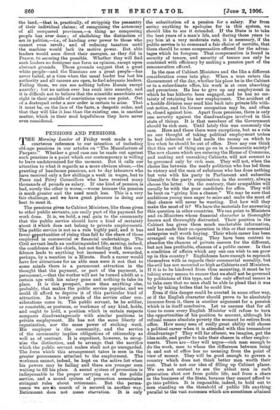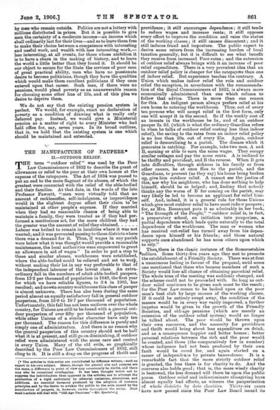PENSIONS AND PENSIONS. T HE Morning Leader of Friday week made
a very courteous reference to our intention of including old-age pensions in our articles on " The Manufacture of Paupers." Whether a good case can be made out against such pensions is a point which our contemporary is willing to leave undetermined for the moment. But it calls our attention to what it regards as a more obvious abuse,—the granting of handsome pensions, not to day labourers who have received only a few shillings a week in wages, but to Peers and Privy Councillors who have received many thousands of pounds as salary. If one kind of pension is bad, surely the other is worse,—worse because the pension is much greater and the need much less. This is a very fair challenge, and we have great pleasure in doing our best to meet it.
The pensions given to Cabinet Ministers, like those given to other public servants, are really part of the payment for work done. It is, we hold, a real gain to the community that the public service should have a, kind of certainty about it which does not belong to private employments. The public service is not as a rule highly paid, and it has fewer opportunities of rising than fall to the share of those employed in commercial or financial undertakings. The Civil servant leads an undistinguished life, earning, indeed, the confidence of his chiefs, but not finding that this con- fidence leads to anything but increased work, rewarded, perhaps, by a mention in a Minute. Such a career would have few attractions for an able man were it not that to some minds there is a paramount attraction in the thought that the payment, or part of the payment, is permanen 1,—that the worker will not be turned adrift at a certain age with his salary gone and nothing to take its place. It is this prospect, more than anything else, probably, that makes the public service popular, and we could ill afford to deprive it of this particular kind of attraction. In a lower grade of the service other con- siderations come in. The public servant, be he soldier, or constable, or postman, or workman of any kind, holds, and ought to hold, a position which in certain respects compares disadvantageously with similar positions in private employment. He has not the same liberty of organisation, nor the same power of striking work. His employer is the community, and the service of the community implies obligations of citizenship as well as of contract. It is expedient, however, to recog- nise the distinction, and to arrange that the sacrifice which the public servant makes shall not go unregarded. The form which this arrangement takes is seen in the greater permanence attached to the employment. The workman cannot, indeed, be kept on the active list when his powers may be failing and there are younger men waiting to fill his place. A sound system of promotion is indispensable to the proper carrying on of the public service, and a sound system of promotion necessitates stringent rules about retirement. But • the perma- nence we are in search of is secured in another way. Retirement does not mean starvation. It is only the substitution of a pension for a salary. Far from seeing anything to apologise for in this system, we should like to see it extended. If the State is to take the best years of a man's life, and during those years to pay him at a very moderate rate, it is necessary, if the public service is to command a fair choice of recruits, that there should be some compensation offered for the advan- tages which he foregoes. • That compensation is found in security of tenure, and security of tenure can only be combined with efficiency by making a pension part of the remuneration offered.
In the case of Cabinet Ministers and the like a different consideration come into play. When a man enters the Government of the day, whether his place be in the Cabinet or in a subordinate office, his work is at once absorbing and precarious. He has to give up any employment in which he has hitherto been engaged, and he has no cer- tainty of retaining his new employment. The accident of a. hostile division may send him back into private life with- out notice, and his former occupation may be, and often is, closed against him. Apart from pensions, there is only one security against the disadvantages involved in this state of things. It is that members of the Government should be rich men. Until lately this was commonly the case. Here and there there were exceptions, but as a rule no one thought of taking political employment unless he had inherited or had made the money on which to live when he should be out of office. Does any one think that this sort of thing can go on in a democratic society? The new classes which are entering the House of Commons, and making and unmaking Cabinets, will not consent to be governed only by rich men. They will not, when the choice lies between the needy politician who has led them to victory and the man of substance who has done nothing but vote with his party in Parliament and subscribe liberally to the party organisation in the country, always choose the latter. On the contrary, their sympathies will usually be with the poor candidate for office. They will be bent on "giving him a chance." We may be sure that ambitious young men eager to seize and make the most of that chance will never, be wanting. But how will they make the most of it? We have the materials for answering this question in other countries. We can point to Ministers and ex-Ministers whose financial character is thoroughly known and thoroughly distrusted. Their position in the Cabinet has given them much marketable information, and has made their co-operation in this or that commercial enterprise well worth buying. Their whole career has been arranged on this footing. They have been content to abandon the chances of private careers for the different, but not less profitable, chances of a public career. Is that a condition of affairs which any one can wish to see grow up in this country ? Englishmen have enough to.reproach themselves with as regards their commercial morality, but the evil has not mounted so high as Cabinets and Ministers. If it is to be hindered from thus mounting, it must be by taking every means to ensure that we shall not be governed by politicians of this type, and the only effectual means is to take care that no man shall be able to plead that it was only by taking bribes that he could live.
Even if this danger could be averted in some other way, or if the English character should prove to be absolutely immune from it, there is another argument for a pension which is in itself conclusive. Let us assume that for all time to come every English Minister will refuse to turn the opportunities of his position to account, although his refusal means absolute poverty the moment he retires from office. How many men of really great ability will choose a political career when it is attended with this tremendous disadvantage? They will far oftener, we imagine, put the idea aside, and prefer to take their chance in other employ- ments. There are—they will argue—rich men enough to do the work, men to whom the difference between being in and out of office has no meaning from the point of view of money. They will be good enough to govern a country which does not think better men worth their cost. That is not our idea of filling up Cabinet places. We are not content to see the ablest men in each generation shut out from public life, and from a share in the business of the State, because they cannot afford to go into politics. It is impossible, indeed, to hold out to men standing on the threshold of public life anything parallel to the vast successes which are sometimes attained by men who remain outside. Politics are not a lottery with millions distributed in prizes. But it is possible to give men the certainty of a moderate income—an income which shall ordinarily last for their lives—and so to leave them free to make their choice between a competence with interesting and useful work, and wealth with less interesting work,— less interesting, at all events, for those whose ambition it is to have a share in the making of history, and to leave the world a little better than they found it. It should be our object to secure for the State the services of poor men of great practical ability, men who have no passionate desire to become politicians, though they have the qualities which would make them excellent politicians if they once entered upon that career. Such men, if there wore no pensions, would plead poverty as an unanswerable reason for choosing some other line of life, and of this plea we desire to deprive them.
We do not say that the existing pension system is perfect. We would, for example, exact no declaration of poverty as a condition of drawing what is really only deferred pay. Instead, we would give a Ministerial pension as a matter of right to every Minister who bad held office for, say, seven years. In its broad outlines, that is, we hold that the existing system is one which should be maintained and extended.







































 Previous page
Previous page